What is modern slavery?
What is modern slavery?
Modern slavery is when a person is exploited by others, for personal or commercial gain. The person loses their freedom and their ability to make choices for themselves
For example:
- the person is forced to work and not free to stop working or leave their place of work;
- the person is forced to work in a private home with no personal freedom.
An exploiter might threaten, control, trick or use a large debt to force a person to work and make it difficult for them to leave.
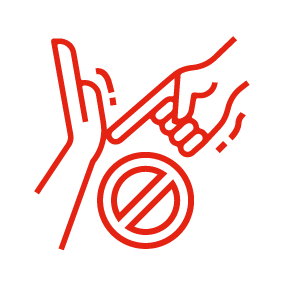 |
Coercion and threats |
Exploiters use coercion and threats to intimidate people to make them feel afraid to leave their workplaces. For example, exploiters might use:
- threats to hurt the worker or their families if they try to leave, complain or seek help;
- threats of deportation and reporting to immigration;
- threats to blacklist the worker so they do not get any other jobs.
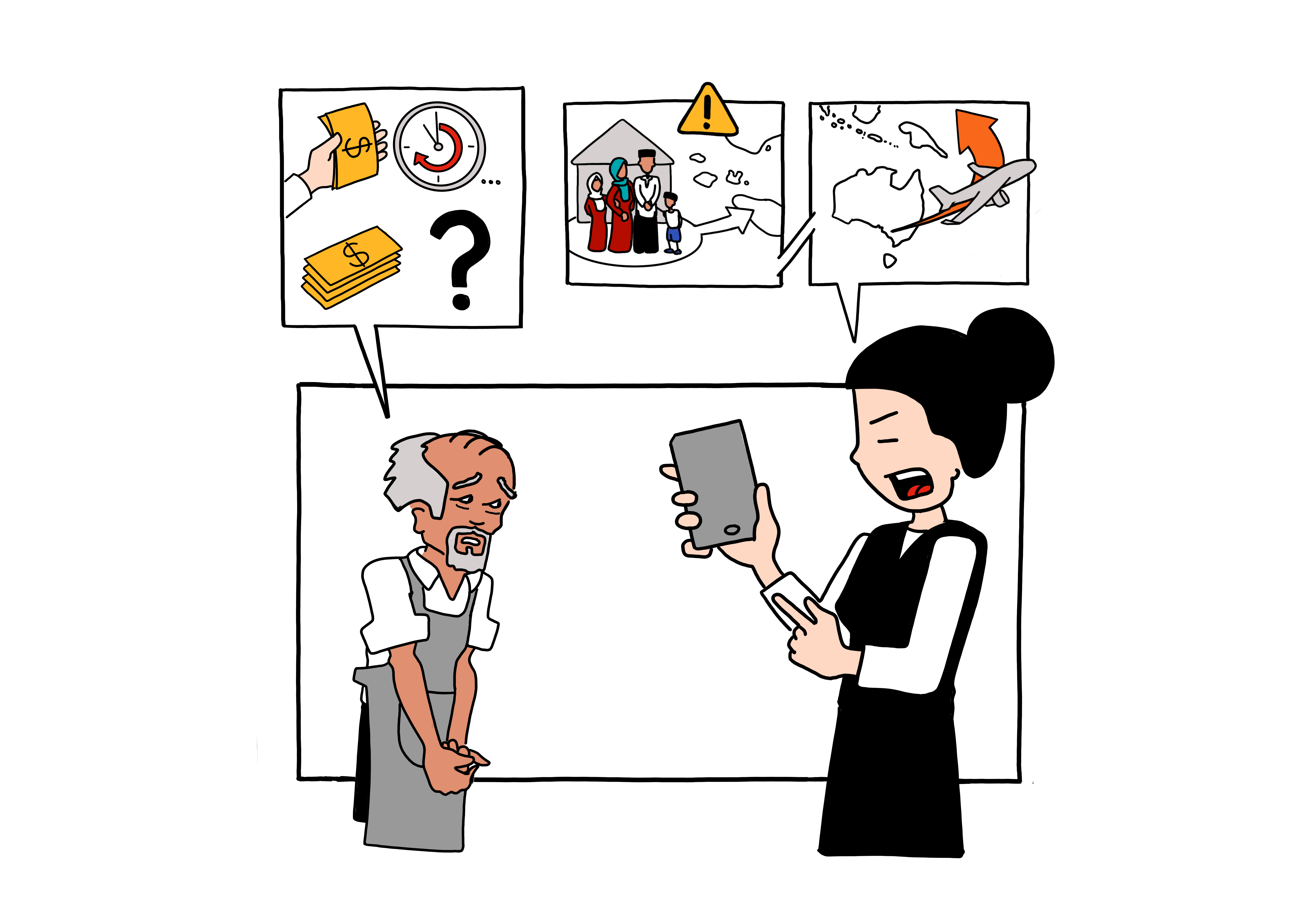
 |
Debts |
Exploiters often use debt to force someone to continue working or prevent them from leaving. Often the debt is too big, and the person may never be able to pay off the debt. For example, the worker has a large debt and little control over how long they must work or what type of work they need to do to pay back the debt.
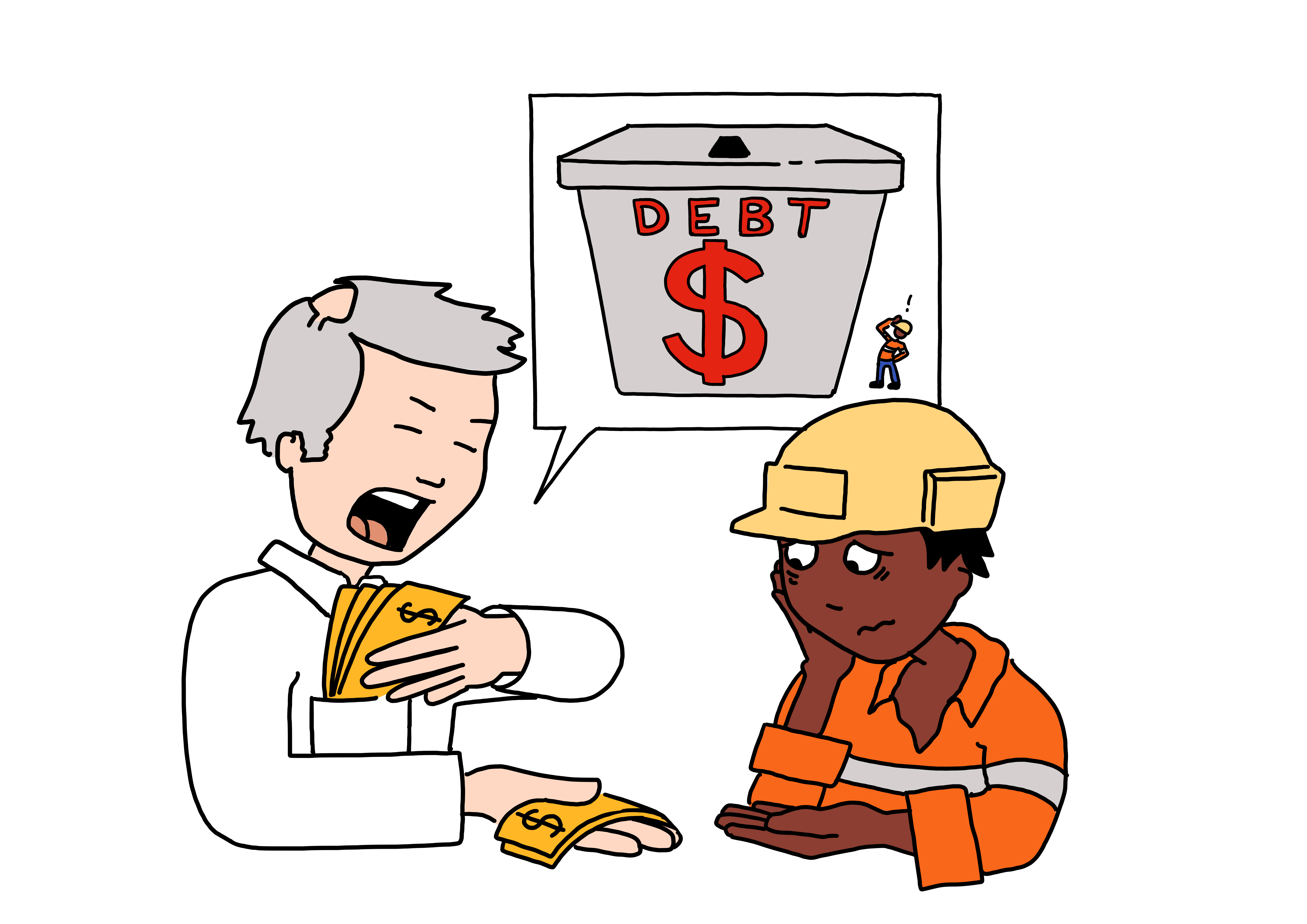
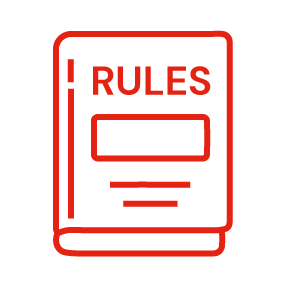 |
Rules and controls |
Exploiters use rules and controls to make it difficult for someone to leave a situation and find help. For example, exploiters might:
- limit a worker’s access to food, the bathroom, breaks or medical care;
- restrict a worker’s communication with friends and family outside of their work environment;
- monitor their communication.
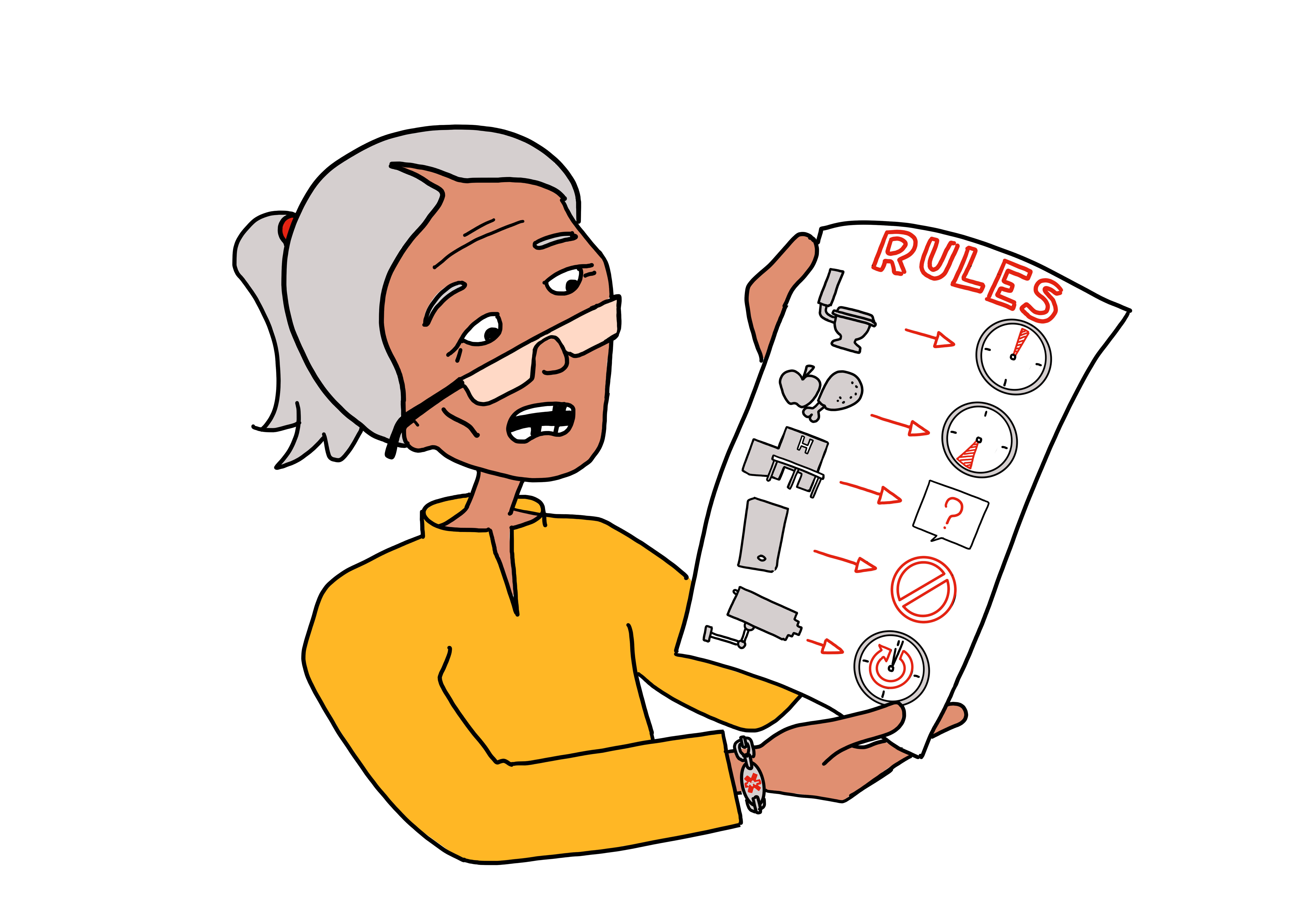
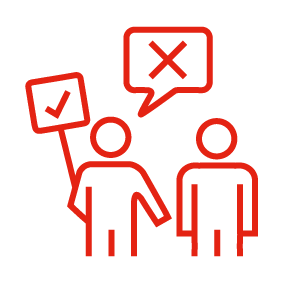 |
Deception and lies |
Exploiters often deceive and lie to someone before they start working or to prevent them from leaving their workplace. For example, exploiters might:
- make fake promises about the type of work, the number of working hours, pay or living conditions;
- tell someone they have no rights, or they will be deported if they try to seek help.
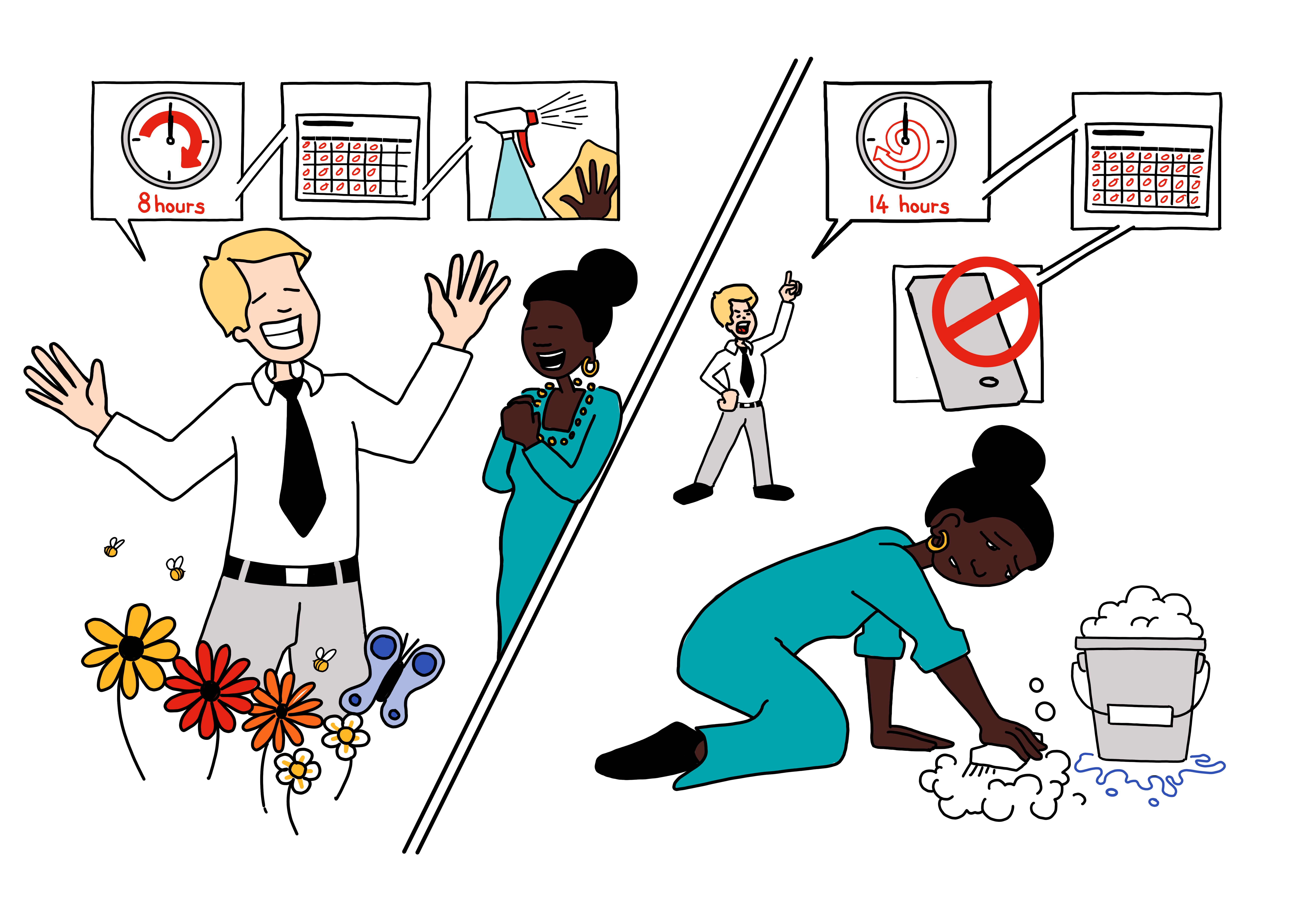
Modern slavery is a crime that happens in Australia. It can happen to anyone including men, women and children.
Examples and signs of modern slavery
Forced labour
People who experience forced labour are forced to work against their will or under threat of punishment. They might work long hours in poor conditions and for little or no pay. They might have a large debt to an employer or sponsor, but the debt is too big to ever repay. People can be forced to work in any industry including construction, farming, manufacturing, retail and hospitality.
Signs of forced labour
You might be experiencing forced labour if:
- you do not have access to, or control of your earnings;
- you are paying off a large debt to an employer or sponsor and are not free to stop working;
- you work very long hours and are not allowed to ask for time off;
- money is taken out of your wages for tools, food, accommodation;
- your employer or sponsor arranges work, transportation, accommodation and phone calls for you;
- you are forced to do unsafe work and/or unable to negotiate your working conditions;
- your employer or sponsor threatens to cancel your visa or contact the authorities (e.g. the police) if you complain;
- your employer or sponsor threatens to harm your family if you complain;
- you do not have access to your passport, identification and other important belongings.
Bobby’s story(name has been changed)

Eventually, Bobby was able to get help from a friend and was referred to the Support for Trafficked People Program. He received casework, financial, education, and training
Watch this video to learn more about forced labour in Australia
Domestic servitude
People who experience domestic servitude are forced to work in private houses, often as nannies, housemaids or cleaners. They often work very long hours, sleep in shared areas, are unpaid, and have little or no freedom.
Signs of domestic servitude
You might be experiencing domestic servitude if you:
- live with and work long hours for a family in a private home;
- aren't allowed to leave the house without the employer;
- do not have your own private space to sleep;
- are insulted, abused, threatened or violence is used in the house.
Adeline’s story (name has been changed)

Eventually, Adeline managed to leave the house and contacted the police. Adeline received casework, financial support and help accessing accommodation and counselling under the Support for Trafficked People Program.
Watch this video to learn more about domestic servitude in Australia.
I need help
If you, or someone you know is exploited at work, help is available. If it is an emergency or there is a threat to your safety, call the police on 000.
If you are experiencing modern slavery and you would like free and confidential information about support options, contact:
Australian Red Cross
We provide support to migrants all over the country, including people who have experienced human trafficking, forced labour or forced marriage. You may be eligible for a support program that can provide:
- Casework support
- Financial support
- Employment support
- Access to health care
- Support to find a safe place to live
- Counselling and emotional support
We can also provide you with information about other organisations and agencies that might be able to help.
Phone 1800 113 015
Email National_stpp@redcross.org.au
Website redcross.org.au/stpp
For free and confidential legal and migration assistance, contact:
Anti-Slavery Australia
Anti-Slavery Australia can provide free and confidential legal and migration assistance if you are experiencing modern slavery, including severe exploitation at work anywhere in Australia.
They can help you:
- Find out about your legal rights and your options
- Apply for a visa and talk to immigration
- Stay safe through safely plans and court orders
- Take legal action
- Find other support – like counselling, housing and financial help
- Make reports to the police, if you want to
Phone 02 9514 8115
Email antislavery@uts.edu.au or use the online contact form
Website antislavery.org.au
To report or discuss a concern, contact:
Australian Federal Police
The Australian Federal Police (AFP) can protect people who are experiencing human trafficking, forced labour or forced marriage. You can ask them to refer you to Red Cross. If you are not comfortable contacting the federal police, you can contact Red Cross for advice.
Phone 131 237 (131 AFP)
Website afp.org.au or make a report online